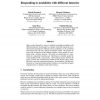139 search results - page 19 / 28 » Multiple Model-Based Reinforcement Learning |
107
Voted
NIPS
2004
15 years 3 months ago
2004
Motor control depends on sensory feedback in multiple modalities with different latencies. In this paper we consider within the framework of reinforcement learning how different s...
134
click to vote
GECCO
2005
Springer
15 years 7 months ago
2005
Springer
In neuroevolution, a genetic algorithm is used to evolve a neural network to perform a particular task. The standard approach is to evolve a population over a number of generation...
116
Voted
BC
2008
15 years 2 months ago
2008
In this paper we introduce a simple model based on probabilistic finite state automata to describe an emotional interaction between a robot and a human user, or between simulated a...
109
Voted
IJCNN
2006
IEEE
15 years 8 months ago
2006
IEEE
— Delegating the coordination role to proxy agents can improve the overall outcome of the task at the expense of cognitive overload due to switching subtasks. Stability and commi...
166
click to vote
AAMAS
2005
Springer
15 years 2 months ago
2005
Springer
Cooperative multi-agent systems are ones in which several agents attempt, through their interaction, to jointly solve tasks or to maximize utility. Due to the interactions among t...


